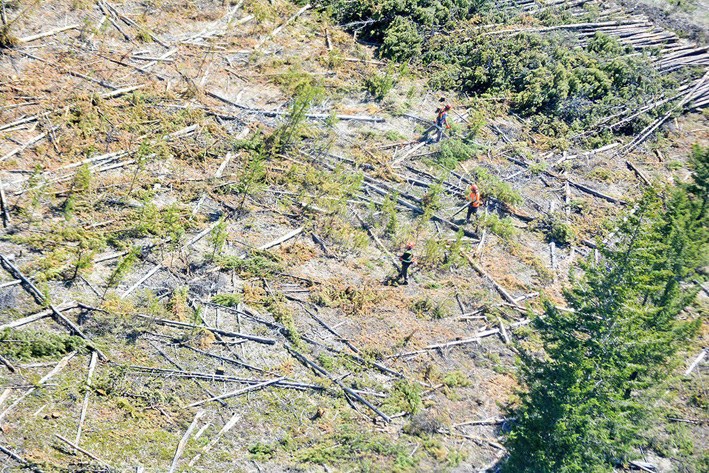A joint venture company owned by two First Nations west of Williams Lake has recovered more than 3,000 truckloads of residual waste generating millions in sales for a product that would otherwise be burned.
Tsideldel and Tl’etinqox’s Central Chilcotin Rehabilitation Ltd. launched the first phase of the project three years ago to reduce wildfire risks and rehabilitate mountain pine beetle impacted forests west of Tl’etinqox after receiving a $3.4-million grant from the Forest Enhancement Society of BC (FESBC).
The second phase of the project was launched in September 2019 through an additional $1-million grant by FESBC to recover and use at least 200,000 cubic metres of waste wood fibre that accumulated during the first phase of the project.
Rather than being burned, recovered pulp-grade logs are being hauled to Cariboo Pulp in Quesnel. Remaining material is ground up by Tsi Del Del Ltd. before it is shipped in Williams Lake to Pinnacle Renewable Energy’s pellet plant or Atlantic Power.
“This project is allowing First Nation-owned business to expand capacity and expertise as the forestry industry transitions from a harvest economy to a forest-management economy,” stated Hugh Flinton, forestry manger, Central Chilcotin Rehabilitation Ltd.
Since September last year, the recovery effort has resulted in 200,000 cubic metres of residual fibre being utilized creating between $7 million and $8.5 million in sales. Full-time employment has also been provided to about nine loggers, truckers and other forestry workers.
The two First Nations which hold multiple forest licenses aim to increase their use of wood waste and bring an additional 20 to 50 per cent of leftover wood fibre to market.
“First Nations leadership has reduced wildfire risks and rehabilitated forests, and now the company [Central Chilcotin Rehabilitation Ltd.] is ensuring that the residual fibre is also put to good use,” Minister of Forests, Lands, Natural Resource Operations and Rural Development, Doug Donaldson said in a news release.



